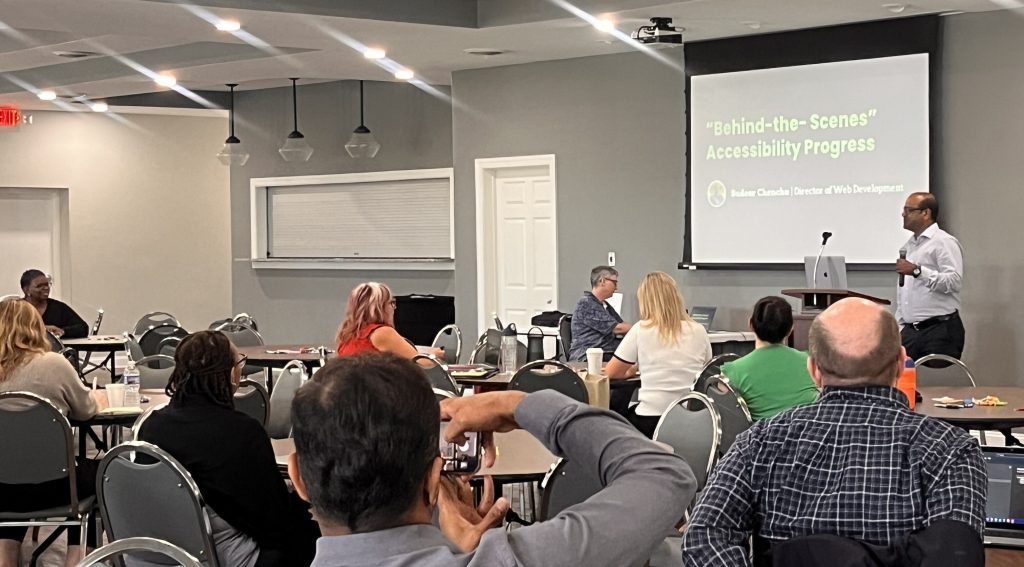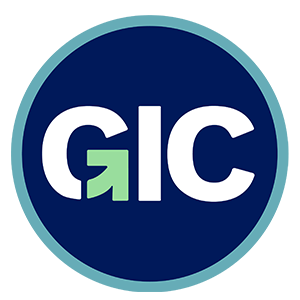Workshopping WordPress Accessibility
Last updated on August 07th, 2025
An invigorating forum in Dover last month, as the GIC hosted a Website Accessibility Workshop for dozens of dedicated Delaware state agency website stakeholders. We had a great group of engaged web editors and agency members, and we can’t thank them all enough for taking time out of their busy schedules to focus on this important issue.

Our workshop dove into the basics of website accessibility and hopefully explained the mutual roles that will be required to meet the upcoming April 24, 2026 accessibility deadline. Specifically, that the GIC is working on the coded, functional and design accessibility issues, while agencies need to be responsible for accessibility issues within the content itself.
However, we are always here to consult, advise, and lend moral support on this task we face together!
Top Five Most-Asked Questions at the Workshop
Here are the five most-asked questions by our workshop attendees, compiled in person, in print, and anonymously:
- How do I make PDFs accessible and compliant with WCAG standards?
- How do I write effective and accessible alt text?
- What tools can I use to check or improve accessibility?
- Are interactive features like accordions or carousels accessible?
- What does GIC’s support look like now and going forward?
Great questions!
Let’s see if we can start to tackle these at a high level, and then we’ll answer a few of the other questions we got:
PDFs
These are a huge challenge in government websites. Why? Because there is so much legacy material that originated in print form before being turned into a non-accessible image that screen readers don’t recognize. There’s no one answer to this challenge, but here’s how we recommend getting started in your review of your website’s PDFs.
P.S. – Consider removing or archiving old, outdated material that your visitors aren’t searching for.
Alt Text
There are a couple kinds of alt text issues that we see a lot in state websites. First, images that have no alt text whatsoever. Secondly, images that have inaccessible or lazy alt text. All images posted in our WordPress sites are required to have alt text in order to be published, but that doesn’t stop some people from entering a generic word like “image” or even a couple of random characters to satisfy the requirement. Run a website scan with one of the tools below to see if your alt text is getting flagged.
Here’s more information on identifying and addressing inaccessible alt text.
Tools
Scan a web page: WAVE Web Accessibility Evaluation Tool
(Developed by Utah State University)
Scan a PDF: PAVE PDF Accessibility Validation Engine
(Developed by Zurich University and the Swiss Association of the Blind and Visually Impaired)
More Tools and Resources at the GIC’s Accessibility Central page.
Carousels, Galleries & Accordions
Image carousels and galleries are traditionally not accessible because they often involve motion that can’t be started and stopped or aren’t marked in ways that screen readers can identify. Our official recommendation is to avoid them, if possible, to avoid these concerns. Consider utilizing a hero section for prominent imagery.
That said, these features can still be accessible as long as they are set up correctly, so the tabbing function works to open and close slides, and the left and right arrow keys work to switch between them.
Accordions that open up from a menu can be an effective way to reveal longer-form information. Accordions can also be accessible, provided they are set up for the same key configurations as with image carousels and galleries. They must be clearly marked visually and for screen readers, and work with a tab key to open and close each accordion’s content.
The GIC Role
We are working behind the scenes to make universal improvements like external link identifiers, accessible color schemes, screen reader compatibility, and other enhancements. Our team is also a consultative resource, and we can make recommendations to help you make tough decisions regarding your website’s content. We’ve created a new form for agency website stakeholders to ask any questions they might have about accessibility.

Other Workshop Questions
We had some great question-and-answer sessions and covered a lot of ground during our sessions. We also offered participants the opportunity to submit questions anonymously during and after the workshop. Here are some of those questions, and our responses:
What does A11y mean?
It’s an abbreviation of the word “accessibility” – the “11” representing the eleven letters between the a and the y, with a nod to the word ally.
Will all external links open in new tab and have the icon added automatically or do we need to add them?
Yes, all external links will open in a new tab, and the external link icon will be added automatically.
However, there is a difference in how external links are defined in CLF 4 versus the new Lighthouse design system:
- In CLF 4: Any URL that is not the same as the current site URL is considered external. For example, if you’re on
gic.delaware.gov, any link that does not go to anothergic.delaware.govpage is treated as external—even if it’s another Delaware agency site ending in.delaware.gov. - In Lighthouse: Only URLs that do not end with
.delaware.govare considered external. So links to other agency sites within the.delaware.govdomain are not treated as external.
For YouTube videos, do we need to always use the auto closed captions option? Is it good enough to be compliant?
Unfortunately, auto-captioning in both YouTube and Vimeo is not always good enough to be compliant. There are often complaints about accuracy of the transcripts as they are affected by accents, fast or overlapping speech, and background noise. Auto captions also don’t identify speakers by name, which can be critical for clarity. The best option is to upload a custom caption file that has been manually reviewed and edited. Here’s how to review and address accessibility in videos.
Do the rules apply to Social Media posts?
Yes. The laws refer to digital content as a whole, which includes websites, mobile apps, and social media posts.
How much of the rules apply to pre-existing / old content such as old press releases?
All of the rules apply to all of the content that is live on your website, and not blocked off in a clearly-marked archive section.
How do we go about making 1000’s of PDFs accessible?
Consider breaking those PDFs into sections of most-accessed to least. Try to archive PDFs that are outdated or no longer relevant, such as news releases from years ago. See if you can enlist a team to tackle this job, breaking it into chunks and setting aside at least a few hours a week to go through it. There are also paid services that will convert PDFs, but that could be cost-prohibitive. Unfortunately, the rules are the same whether you have five PDFs on your site or five thousand.
Do we know what penalties will be if we do not meet WCAG requirements?
It is likely a case-by-case situation, but there are parameters for accessibility penalties that we recently examined in this blog.
If we use outside vendors, how do we know they will meet WCAG requirements?
Ask them what they are doing to ensure it. Ask them if they can provide you with an accessibility review of the site. Alternatively, run your own scan through one of the tools above and meet with your vendor to discuss.
How do we maintain compliancy moving forward as content is added and updated?
Vigilance, dedicated attention to new content as it’s posted, scheduled audit/review/edit sessions. Try to build new systems that have these reviews as part of the process before content is added to your website.
Our workshop generated great conversations about an important subject. It’s a topic that people don’t like to admit they have questions about, but we’re here to help answer them.
Please remember our new form, created to help agencies reach out directly to us with any accessibility questions:
We received encouraging feedback from our attendees, and we ask you to stay tuned for future online workshops we’ll be scheduling. The next ones will focus on specific areas of accessibility compliance!
Make a plan to review and remediate your site’s accessibility today! We’re here to help!!
Read more articles about: Accessibility, Content Strategy, Data, Design, Lighthouse, User Research.
Subscribe Now:
Follow our blog for the latest GIC updates, accessibility tips, and dev trends affecting Delaware agency websites.
Browse by Topic:
- Accessibility
- Accessibility Newsletter
- Announcement
- CLF
- Content Strategy
- Data
- Design
- Lighthouse
- Livestream Production
- Uncategorized
- User Research
- Video Production
Browse by Date:
- February 2026
- January 2026
- December 2025
- November 2025
- October 2025
- September 2025
- August 2025
- July 2025
- June 2025
- May 2025
- April 2025
- March 2025
- February 2025
- January 2025
- December 2024
- November 2024
- October 2024
- September 2024
- August 2024
- July 2024
- June 2024
Feedback:
Have an idea for a blog post or feedback on an existing post? We would love to hear from you!





